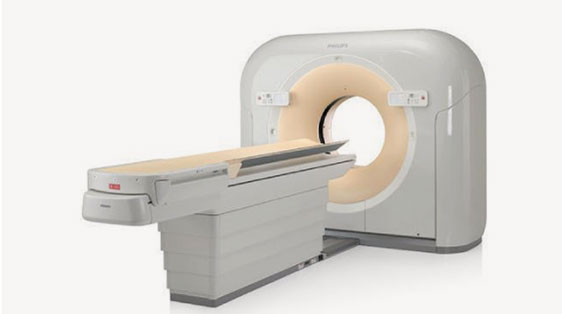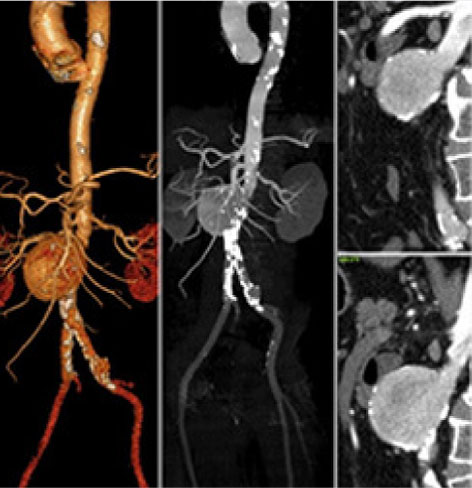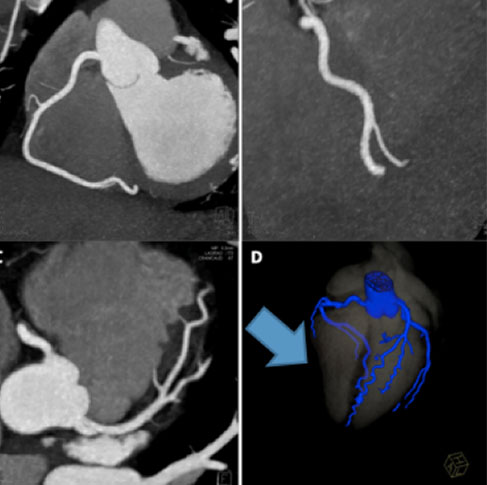128 Slice
MDCT Scan

What is MDCT Scan and 128 Slice CT Scan?
Computed tomography (CT) scan is a safe, painless, non-invasive test that uses a series of X-rays and a computer to produce images of a cross-section of your body and a 3D image of soft tissues and bones. Sometimes, a contrast agent called a dye, may be used as an Oral/ Intravenous/ Enema, depending on the type of CT scan and reason for the scan, to improve the images by highlighting certain features. It can take anywhere from a few minutes to half an hour for the scan.
When a patient passes through the CT scanner, the circular opening rotates and takes x-rays. Each rotation takes about a second. During the rotation, radiation beams are used to create an image of the patient’s body inside the circular opening. In single slice CT-scanners, only one image is produced per rotation.
MDCT stands for Multidetector Computed Tomography, also known as multislice computed tomography (MSCT). “Multidetector” refers to the number of CT sc detectors that are used to detect X-rays as they pass through the body. A 128-slice CT scan machine has 128 detectors, which allows it to acquire multiple images in one rotation.
128-slice CT Scanner Benefits
As compared to 16 or 64-slice, the 128-slice CT scanner has more detectors that provide highly detailed imaging with higher resolution, superior quality and faster scanning speed.
MDCT Scan Services
- CT SCAN ALL PARTS – (PLAIN + CONTRAST)
- CT GUIDED BIOPSY
- CT GUIDED FNAC
- 4D CT FOR PARATHYROID ADENOMA
- 3D CT JOINTS / BONES
- HRCT – THORAX / COCHLEA / TEMPORAL BONE
- CT DYE STUDY
- CT ENTEROGRAPHY
- DENTA SCAN
- HEAD & NECK ANGIOGRAPHY
- BRAIN ANGIOGRAPHY
- PULMONARY ANGIOGRAPHY
- RENAL ANGIOGRAPHY
- PERIPHERAL ANGIOGRAPHY (UPPER/LOWER LIMB)
- ABDOMINAL / MESENTERIC ANGIOGRAPHY
- TAVI /TAVR PROTOCOL AORTOGRAPHY
- CORONARY ANGIOGRAPHY
- CT DISTAL LOOPOGRAPHY

![]()
Click Here To Know More About Preparations & Procedure

CT Coronary Angiography
CT Angiography is the best non-invasive option to rule out any coronary artery disease. It takes only 5 seconds to scan the arteries with the least radiation to the patient & needs no hospitalization.
It has 2 components:
- Calcium Scoring
- Coronary Artery Assessment
![]()
Click Here To Know More About Preparations & Procedure

128 SLICE MDCT SCAN/CT CORONARY ANGIOGRAPHY Services FAQs
128 Slice MDCT Preparation.
If your CT scan uses dye or contrast, you may need to come with some specific preparation:
Blood test
Creatinine report (done no later than two weeks before).
Diet restrictions
- You will need to watch what you eat and drink for four hours before your CT scan. Consuming only clear liquids helps prevent nausea when you receive the contrast dye. You can generally have tea or black coffee or strained fruit juices.
- If you are or might be pregnant, you should tell the CT technician to avoid exposing your baby to radiation.
Who should undergo Cardiac CT?
- Patients at high risk for developing coronary artery disease – risk factors include high lipid levels, family history, smoking, diabetes, hypertension, stressful life, sedentary lifestyle.
- Post-bypass/ Stent assessment.
- Even if ECG, Echo, Stress test is relatively normal, major coronary artery disease can be present.
Conventional catheter angiography needs hospitalization and it indicates if there is evidence of acute myocardial infarct changes on ECG or Ca score -> 400.
What preparation is involved for Cardiac CT?
- Fasting for at least 2 to 4 hours before the procedure.
- Serum creatinine report (done no later than two weeks before).
- Stabilization of heart rate with a beta-blocker.
- Bring all previous test reports including MRI, CT or any other papers.
- There should preferably be an accompanying friend or relative with the patient.
What does the procedure involve?
- Once the heart rate is stabilized.
- A vein is cannulated.
- Breathing instructions are given so that the patient can hold his/her breath for about 5 seconds for the calcium scoring study.
- A non-ionic “dye” is injected and the coronary CT Angiogram study is performed.
- The scan time is about 5 seconds & the total on table procedure time is 15–20 minutes.
- The entire procedure takes about 60 minutes depending on the heart rate.
Are there any dangers of CT Scanning?
- Though X-rays involve radiation, there are no dangers in practice.
- Contraindicated in pregnant women.
- CT coronary angiography with 128 Slice CT scan involves very little radiation to patients ranging approximately between 3-14 mSv.
